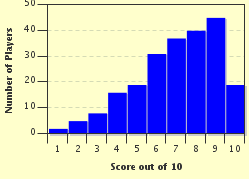Quiz Answer Key and Fun Facts
1. The Declaration of Independence that sparked the American Revolution was published on July 4, 1776. However, what book published in Scotland on March 9, 1776 is central to the economic revolution that goes hand in hand with the Declaration's political impact?
2. The headline for June 15, 1215 reads "John of England forced by barons to accept Magna Carta". This set the stage for the gradual reduction of the power of the English monarchy. Half a world away, at the same time, what great king was expanding his power by burning the city of Beijing?
3. In 1492 Columbus sailed the ocean blue. To be exact, Christopher Columbus left Palos, Spain on August 3, 1492. On the same day which group of Spaniards had to convert to Catholicism, leave the country or face death?
4. November 22, 1963 is a black day in American history that is still shrouded in mystery. President John F. Kennedy was assassinated while driving in a motorcade in Dallas Texas. This tragedy overshadowed the death of two of the greatest British authors of the 20th Century. Which pair of deaths was overshadowed by the shocking events in Dallas?
5. Here is a conundrum for a clairvoyant newspaper editor in 1642. What is the more significant event, the death of Galileo or the birth of the man who co-created calculus and revolutionized the study of mechanics? Name the great English physicist and mathematician that was born on December 25, 1642 (Julian)?
6. The year is 1666 and the headlines all read "London is burning". In Morocco 1666 is recalled as the year that Mulay Al-Rashid unified the country. Al-Rashid's descendants continue to rule Morocco. What is the name of this North African dynasty?
7. The year is 1861, and as one country disintegrates another unites. On February 18, Jefferson Davis is inaugurated as President of the Confederated States of America. On the same day, Victor Emmanuel II became the first modern king of what united country?
8. The sinking of the Lusitania by a German submarine on May 7, 1915, killing almost 1200 civilians, grabbed the headlines. On the same date British, Australian and New Zealand troops were mired in an unsuccessful bloody campaign against the Ottoman Empire. Where in modern Turkey was this important campaign waged?
9. On July 14, 1789 French revolutionaries stormed the Parisian prison, the Bastille, defying the authority of King Louis XVI sparking the start of the French Revolution. A month earlier on June 14, 1789, a small boat limped into Kupang Harbor on the island of Timor. The boat carried loyal sailors that were expelled from the HMS Bounty in a mutiny along with their Captain. Who was the Captain that survived the "Mutiny on the Bounty"?
10. The year is 550 BC, if there had been newspapers the top story would have been the victory of Cyrus II over the Medes creating the Persian Empire. Thus, the birth of a Chinese religious leader (551 BC) and the start of formal teaching by an Indian Prince named Siddhartha might have gone unreported. What two great, but unrelated, religions grew from these "lesser" events?
Source: Author
adam36
This quiz was reviewed by FunTrivia editor
bloomsby before going online.
Any errors found in FunTrivia content are routinely corrected through our feedback system.

